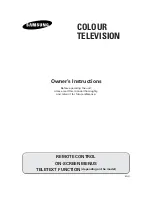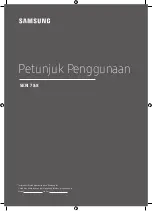
CONTENTS
Page
Page
l
SPECIFICATIONS ........................
l
PRINTED WIRING BOARD ASSEMBLIES ........ 21
l
IMPORTANT SERVICE NOTES ........................ 2
l
SCHEMATIC DIAGRAMS
l
SERVICE ADJUSTMENT ................................. 3
AND WAVEFORMS .................................
SHOOTING TABLE ........................
15
DIAGRAM ..................................... . 33
LAYOUT DIAGRAM
20
.
........................
REPLACEMENT PARTS LIST ........................ 37
IMPORTANT SERVICE NOTES
Maintenance and
service personnel on
air of this receiver should be done by qualified
y.
SERVICING OF HIGH VOLTAGE SYSTEM AND PICTURE TUBE
When servicing the high voltage system,
remove static charge from it by
connecting a 10
Resistor in series with an insulated wire (such as a test
probe) between picture tube
and
anode lead. (AC line cord should be
disconnected from AC outlet.)
1.
Picture tube in this receiver employs integral implosion protection.
2.
Replace with tube of the same type number for continued safety.
3.
Do not lift picture tube by the neck.
4.
Handle the picture tube only when wearing shatterproof goggles and after discharging the
high voltage completely.
X-RAY
This receiver is designed so that any X-Ray radiation is kept to an absolute
minimum.
Since certain malfunctions or servicing may produce potentially
hazardous radiation with prolonged exposure at close range, the following
precautions should be observed:
1.
When repairing the circuit, be sure not to increase the high voltage to more than
(at
cut-off) for the set.
2.
To keep the set in a normal operation, be sure to make it function on
(at beam
1
in the case of the set.
The set has been factory -Adjusted to the above-mentioned high voltage.
If there is a possibility that the high voltage fluctuates as a result of the repairs, never
forget to check for such high voltage after the work,
3.
D
O
not substitute a picture tube with unauthorized types and/or brands which may cause
excess X-ray radiation.
BEFORE RETURNING THE RECEIVER
Before returning the receiver to the user, perform the
following
checks.
lead dress to make certain that leads are not pinched or that hardware is not
lodged between the chassis and other metal parts in the receiver.
2. Inspect all protective devices such as non-metallic control knobs, insulating fishpapers,
cabinet backs, adjustment and compartment covers or shields, isolation resistor-capacity
networks, mechanical insulators etc.
2
Summary of Contents for 21N52-E1
Page 21: ...PRINTED WIRING BOARD ASSEMBLIES PWM A Wiring Side PWM B Wiring Side 1 I 2 I 3 I 4 I 5 I 6 21 ...
Page 22: ...PWB A Wiring Side I 7 I 8 9 I 10 11 12 22 ...
Page 25: ...PRINTED WIRING BOARD ASSEMBLIES Continued IJ PWB D Wiring Side 1 I 2 I 3 I 4 I 5 I 6 1 25 ...
Page 29: ...SCHEMATIC DIAGRAM SUB CIRCUIT 29 ...
Page 31: ...SCHEMATIC DIAGRAM MAIN CIRCUIT ...
Page 33: ...BLOCK DIAGRAM MAIN CIRCUIT 1 1 2 I 3 4 I 5 I 6 3 3 ...
Page 34: ...1 7 8 9 I 10 11 I 12 I 34 ...
Page 35: ...BLOCK DIAGRAM SUB CIRCUIT ADG COIL 7 1 2 1 3 4 I 5 I 6 I 35 ...
Page 36: ...7 I 8 9 10 11 12 36 ...



































